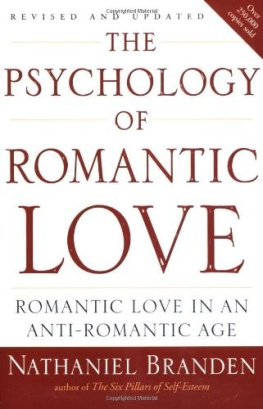Nathaniel Branden
J EREMY P. T ARCHER /P ENGUIN
a member of
Penguin Group (USA) Inc.
New York
JEREMY P. TARCHER/PENGUIN
Published by the Penguin Group
Penguin Group (USA) Inc., 375 Hudson Street, New York, New York 10014, USA Penguin Group (Canada), 90 Eglinton Avenue East, Suite 700, Toronto, Ontario M4P 2Y3, Canada (a division of Pearson Penguin Canada Inc.) Penguin Books Ltd, 80 Strand, London WC2R 0RL, England Penguin Ireland, 25 St Stephens Green, Dublin 2, Ireland (a division of Penguin Books Ltd) Penguin Group (Australia), 250 Camberwell Road, Camberwell, Victoria 3124, Australia (a division of Pearson Australia Group Pty Ltd) Penguin Books India Pvt Ltd, 11 Community Centre, Panchsheel Park, New Delhi110 017, India Penguin Group (NZ), 67 Apollo Drive, Rosedale, North Shore 0632, New Zealand (a division of Pearson New Zealand Ltd) Penguin Books South Africa) (Pty) Ltd, 24 Sturdee Avenue, Rosebank, Johannesburg 2196, South Africa
Penguin Books Ltd, Registered Offices: 80 Strand, London WC2R 0RL, England
Copyright 1980, 2008 by Nathaniel Branden
All rights reserved. No part of this book may be reproduced, scanned, or distributed in any printed or electronic form without permission. Please do not participate in or encourage piracy of copyrighted materials in violation of the authors rights. Purchase only authorized editions.
Library of Congress Cataloging-in-Publication Data
Branden, Nathaniel.
The psychology of romantic love: romantic love in an anti-romantic age / Nathaniel Branden.
p. cm.
Originally published: Los Angeles: J. P. Tarcher, c1980.
Includes bibliographical references and index.
ISBN: 978-1-1012-1614-9
1. Love. I. Title.
BF575.L8B7 2008 2007036429
152.4'1dc22
While the author has made every effort to provide accurate telephone numbers and Internet addresses at the time of publication, neither the publisher nor the author assumes any responsibility for errors, or for changes that occur after publication. Further, the publisher does not have any control over and does not assume any responsibility for author or third-party websites or their content.
To Patrecia Wynand Branden
Romantic love is for grown-ups; it is not for children. It is not for children in the literal sense, and also in the psychological sense: not for those who, regardless of age, still experience themselves as children.
Chapter Four: The Challenges of Romantic Love
C ONTENTS
CHAPTER ONE:
The Evolution of Romantic Love
CHAPTER TWO:
The Roots of Romantic Love
CHAPTER THREE:
Choice in Romantic Love
CHAPTER FOUR:
The Challenges of Romantic Love
A CKNOWLEDGMENTS
This is to acknowledge the invaluable assistance of Dr. Cheri Adrian, who assembled and organized more than fifteen years of my miscellaneous lectures and writings on the subject of romantic love and who, in addition, made immensely helpful contributions to this work in the area of historical research.
I want also to acknowledge the contributions of Jonathan Hirschfeld in the area of historical research.
My thanks to Barbara Branden, who, along with Dr. Adrian and Mr. Hirschfeld, made many valuable editorial suggestions.
My appreciation and deeply felt regard for the sensitivity and skill of my publisher, Jeremy Tarcher, and his superlative editor, Janice Gallagher, whose contributions enhanced in so many ways the quality of this book.
And finally, my deepest gratitude to Devers Branden, who lived through the writing of this book with me on a daily basis, made many helpful suggestions, and provided the emotional support without which I am not certain this book could have been written.
T HE P SYCHOLOGY OF Romantic Love
P REFACE TO THE 2007 E DITION
The Psychology of Romantic Love, originally published in 1980, was written at a difficult time. My wife, Patrecia, had died at the age of thirty-seven in a drowning accident, and I was still in a state of mourning. While working on the booktwo years after the accidentI was raw, vulnerable, emotionally chaotic. Never had the subject of love felt more important to me. I felt I was writing in blood.
It was a book I had wanted to write for more than a decade. My purpose was to project a new view of romantic love and to identify the key factors that are likely to determine the success or failure of this kind of relationship.
Shortly after the book was published, I was interviewed by a newspaper journalist. She asked a number of questions about how I understood the concept of romantic love and what I saw as its challenges, and then she said, Dr. Branden, if you dont mind, Id like to ask you a personal question. Doesnt romantic love scare you?
Her question was totally unexpected, and I was intrigued. Why would it scare me? I asked.
She answered. Youre fifty years old. One doesnt expect to hear people of your age speaking so passionately about romantic love. Im only twenty-eight. I think of so many things that can go wrongthe person leaving you, falling for someone else, or their job taking them away, orshe hesitated, fearing perhaps that she was opening a woundor the person you love dying. Its so frightening. Youve already had a tragedy in your life. And now youve begun a new relationship, and youve written this book. I dont know where the courage comes from, if thats the right word. I feel I dont want passion in my life; I dont want intensity, dont want to go that deep. I guess I value safety more.
I asked, Do you mean that avoiding pain is more important to you than experiencing joy?
Yes.
Well, thats a choice, isnt it?
But she persisted. And also, she went on, the way you write about itlove is a big responsibility. It asks a lot of us.
Yes, it does, I agreed.
I know this sounds awful, she confessed, but Im not sure I want to be that responsible, either.
We said good-bye and I walked away, wondering how many readers would share this young womans feeling that romantic love was more a burden than a source of liberation and joy.
And then I thought of the many needs that romantic love at its best can satisfy. (The list below is longer than the one I included in the original edition of this book.)
First, there is our need for human companionship: for someone with whom to share values, feelings, interests, and goals; for someone to share the burdens and joys of existence.
There is our need to love: to exercise our emotional capacity in the unique way that love makes possible. We need to find people to admire, to feel stimulated and excited by, to whom we can direct our energies.
There is our need to be loved: to be valued, cared for, and nurtured by another human being.
There is our need for psychological visibility (which I shall discuss in some detail): to see ourselves in and through the responses of another person, with whom we have important affinities. This is our need for a psychological mirror, one of the most important aspects of romantic relationships.
There is our need for sexual fulfillment: for a counterpart as a source of sexual satisfaction.
There is our need for an emotional support system: for at least one other person genuinely devoted to our well-being; for an emotional ally who, in the face of lifes challenges, is reliably there .













